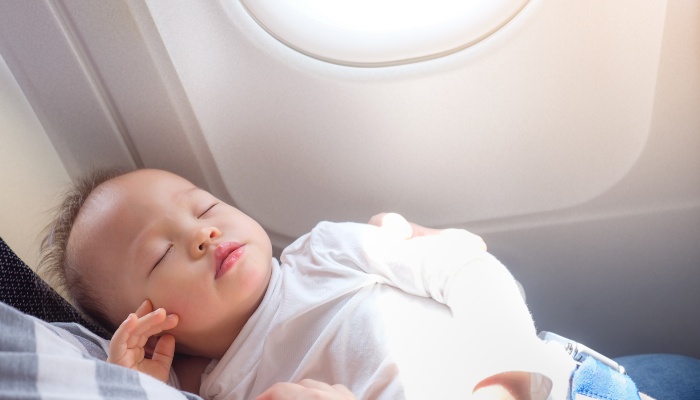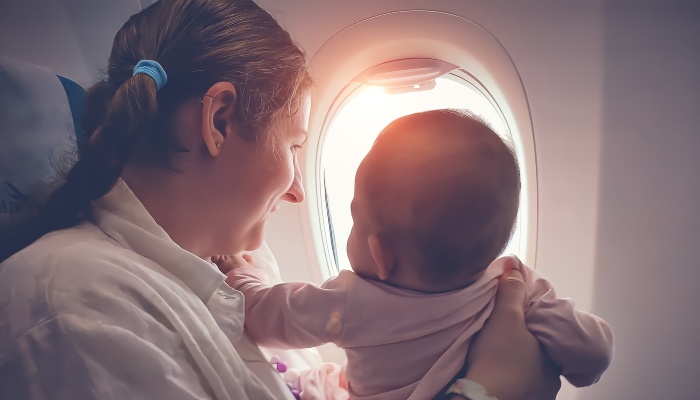Even if you used to find air travel easy before becoming a parent, flying with a child is a completely different experience, especially when it’s your first time flying with a baby.
Among your whirlwind of questions about what to pack and how security works, you may be wondering when your baby is allowed to fly.
There is no legal minimum age requirement, but airlines may have their own age restrictions. The American Academy of Pediatrics (AAP) advises against flying with a newborn unnecessarily soon after birth (less than 28 days) as younger babies are at a higher risk of catching an infectious disease.
Any questions or concerns you have about flying with your little one should always be discussed with your pediatrician as well as your chosen airline to make the safest and most informed decision for your baby.
In the meantime, we’ll look into when you can fly with your little one, complications to consider, and tips for making air travel with an infant as low stress as possible.
When Can Babies Travel by Plane?
Alongside knowing when babies can board a plane, it’s helpful to know what they may need in terms of identification and the potential health and practicality issues of flying with an infant.
Let’s look first at the recommended age for air travel.
Minimum Age To Fly
While there’s no official minimum age, the AAP discourages newborns from flying unnecessarily after birth due to the increased risk of catching infectious diseases.
Some airlines may accept passengers as young as a few days old, so check with your airline about any restrictions for flying with a newborn.
For reference, the World Health Organization (WHO) counts a newborn as any child under 28 days old.
You should also consult your baby’s pediatrician before flying as they may require an extra immunization dose depending on their age or destination.
Possible Complications
Your little one’s first flight will present new challenges for them and you as a parent/caregiver.
From their heightened vulnerability to germs to the practicalities of breastfeeding and changing diapers on a plane, here are some possible issues to be mindful of…
1. Exposure to Germs
Even adult passengers occasionally get sick after traveling by plane, so your baby’s undeveloped immune system is especially at risk from picking up a cold or infection from the flight.
Use liquid hand sanitizer or anti-bacterial hand wipes regularly to help reduce germ exposure.
2. Discomfort or Pain in Baby’s Ears
As the plane takes off and descends, the change in air pressure can cause your baby’s ear to ache.
This pain can be even more pronounced if your little one has had a recent ear infection or surgery, so be sure to consult with their doctor before flying.
3. Breathing Difficulties
The lowered air pressure in the cabin can be a little tougher on young lungs, especially in preemie babies who may have chronic lung or respiratory issues.
Always speak to your baby’s pediatrician before traveling to ensure they are safe to fly.
4. Fussiness
Planes are an unfamiliar world for your baby. Alongside the change in air pressure, the new sights, sounds, and smells of an airplane cabin can upset them, leading to crying fits and generally fussy and irritable behavior.
5. Other Passengers Might Be Annoyed
Most passengers in the vicinity of your wailing baby will simply feel bad for you, but there may be less empathetic, even rude, people on board.
All you can do is come prepared, ignore the haters, and hope for the best!
6. Changing Diapers
You won’t have your usual changing table routine at 40,000 feet, so you must improvise and adapt.
Most parents will need to change diapers in the cabin restroom, but as these can be quite cramped, you could ask a crew member if you could use the cabin floor.
7. Breastfeeding
While breastfeeding is welcomed on flights, some airlines may have safety concerns about holding baby on your lap while flying.
If you’re unable to feed them while seated, attendants may allow you to breastfeed in the galley while drinks/snacks are being served.
The bathroom can be a last resort as this isn’t practical for the time it can take to feed your little one (leading to more annoyed passengers!).
Do Infants Need ID To Fly?
Babies and children under 18 won’t require ID or a passport for domestic flights.
However, all US citizens, including newborns, will need their own passports for international flights.
You’ll need to apply for your child’s passport in person with two parents/guardians present. You can find info on the application steps here.
Do Babies Need a Car Seat on a Plane?
A car seat is recommended for your baby’s safety on the plane as well as sheer practicality.
Even the most pro baby wranglers out there can’t expect to hold a fussy, irritable baby on their lap for an entire flight!
Just ensure that your child’s car seat or CRD (child restraint device) complies with FAA guidelines in terms of belt placement, safe seating, positions, etc.

Tips for Flying With a Baby
Flying with a baby is far from smooth, but careful preparation in each area from their seating and distraction items to deboarding the plane will certainly pay off later!
Here are our top tips on flying safe and sound with your little one.
1. Pack Extra Essentials and Toys
If you’re prepared to carry them in your cabin luggage, pack a little more than you think you need (diapers, pacifiers, extra milk, formula, etc.).
Be sure to bring comfort items for your baby too, such as blankets, books, and favorite toys — the more the merrier depending on the flight duration!
2. Dress Your Little One in Layers
The on-board climate can fluctuate between chilly and stuffy, so it’s a good idea to keep them comfortable by dressing them in sweaters, cardigans, and pants with elasticated waists for easy removal.
3. Prep All Formula, Milk, and Juices
You can bring any amount you need of your baby’s necessary liquids onto a flight as these are all exempt from the TSA’s 3-1-1 rule.
Just ensure they are all packed together in a separate bag/container so they can be screened quickly and easily at security.
4. Feed During Take-Off/Descent
Offer your little one the breast or bottle during take-off and land preparations if you can as the sucking motion can help to equalize the pressure in their ears, reducing pain and discomfort.
Sucking on a pacifier can help for the same reason too.
5. Take Steps To Limit Deboarding Stress
The stress isn’t automatically over once the flight’s over, especially if you have a lot to do before leaving the plane.
First off, try to book a non-stop flight when possible, and choose an aisle seat to make exiting much easier.
Also, if you’re traveling with your partner or family/friends, try to book seats close together so you have some help with the bags, car seat, and baby when getting off the flight!
6. Ask for Assistance!
Lastly, don’t be afraid to ask for help on board. Flight attendants will have seen and dealt with most things when it comes to flying with babies, so if you forgot your little guy’s blanket or burping cloth or need their milk warmed up, most crew members will be more than happy to oblige.
Related Questions:
Do You Have To Pay for a Car Seat on Plane?
No. Most U.S. airlines allow you to check a car seat for free when traveling with a child.
Car seats may be checked in either at the ticket counter with your main luggage or checked at the boarding gate.
They may also be brought into the cabin if your child has their own ticket and assigned seat.
Can You Bring Formula on a Plane?
Yes. The TSA categorizes formula, breast milk, and any baby or toddler food/drink as medically necessary liquids.
Formula is allowed in checked luggage and carry-on bags and can be stored in quantities greater than 3.4 ounces or 100 milliliters.
Inform your TSA officer during the screening process as they may need to be tested.
Closing Thoughts
While there is no set age restriction for babies on board a plane, flying with newborn and premature babies is normally discouraged as fragile immune systems and possible respiratory conditions will be highly vulnerable in the face of cabin germs and changes in air pressure.
Always ensure you have the approval of your baby’s pediatrician before flying, and consult with your airline about age restrictions and any other concerns.
After this, it’s up to you to plan ahead and pack efficiently so that both you and your baby have what’s needed for a safe and pleasant flight. Bon voyage!
Rebecca is a seasoned copywriter and researcher with over a decade of experience, specializing in parenting topics. With a passion for all aspects of raising children, from breastfeeding to potty training.

